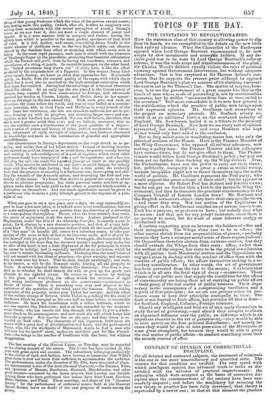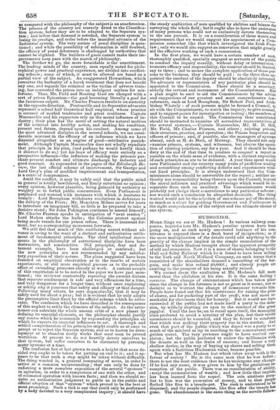CONFLICT OF OPINION ON CORRECTIONAL DISCIPLINE.'
OF all debated and contested subjects, the treatment of criminals is the one in the most unsatisfactory and unsettled state. The reasons for that condition are twofold. The very speed with which intelligent opinion has advanced tends to make us dis- satisfied with the advance of practical improvements: the principles which were accepted as the bases of corrective dis- cipline since the commencement of the century have been suc- cessfully disputed; and before the machinery for reducing the new theory to practice has been fully developed, that theory is superseded by a newer one ; so that at this moment the practice
as compared with the philosophy of the subject is an anachronism. The prisons of the country are scarcely fitted to the Classifica- tion system before they are to be adapted to the Separate sys- tem' and before that demand is satisfied, the Separate system is losing its prestige, and cedes before the manifest advance of the Industrial system. The very nature of penal discipline is ques- tioned; and while the possibility of reformation is still doubted, the efficacy of penal deterrents is challenged by authorities that cannot be slighted. The builders of gaols cannot make their im- provements keep pace with the march of philosophy. The further we go, the more formidable is the unsettlement. The leading minds of the country, men equally noted for philo- sophical power and practical experience, are divided into conflict- ing schools ; some of which, it must be allowed are based on a partial view of the subject. An exaggerated Howardistio, which perceives the barbarity of a harsh treatment that does not benefit any one, and regards the criminal as the victim of adverse train- ing, has converted the prison into an indulgent asylum for mis- fortune. Thus, Mr. Field and Reading Gaol are charged with a sort of prison Epicurism—the gaol becoming literally a goal for the luxurious culprit. Mr. Charles Pearson recoils to an austerity in the opposite direction. Pentonville and its Separatist advocates represent a school half theoretical half empirical, whose practice is accused of morbid tendencies and great costliness. Captain Maconochie and his supporters rely on the moral influence of in- dustry; their plan has the merit of setting the natural motives of the criminal into healthy action, and making his condition, present and future, depend upon his conduct. Among some of the most advanced disciples in the several schools, we see consi- derable mistrust in the efficacy of an influence which we have disputed altogether as an engine of good—retributive punish- ment. Although Captain Maconochie does not wholly repudiate that principle in his plan, (and perhaps he would hardly think it discreet to do so,) yet his hope of efficacy rests entirely on a prospective influence—the influence of making the prisoner pur- chase present comfort and ultimate discharge by industry and good conduct. As expounded in the pages of the Edinburgh Re- view, the last official scheme of improvement, Sir George and Lord Grey's plan of modified imprisonment and transportation, is a cento of compromises. Amid the conflict, it may be safely said that the public mind in general is totally bewildered, and firmly entertains no opinion ; every opinion, however plausible, being gainsaid by authority so weighty as to forbid public concurrence. Even Parliament is perplexed and worried with instances with which it hesitates to comply : Lord Brougham withdraws resolutions in deference to the dubiety of the Peers; Mr. Monckton Mines moves for leave to introduce an imaginary bill, so little is he prepared to take a decisive stand ; Sir John Pakington continues to amend himself; Mr. Charles Pearson speaks in anticipation of "next session "; Lord Mahon attacks the hulks ; the Colonies protest against being made vessels for our prison refuse. There is incessant fer- ment, but no corresponding movement forwards. We still feel that much of this oscillating unrest without ad- vance is owing to the want of a distinct and authoritative settle- ment of fundamental principles. The chief intellectual move- ments in the philosophy of correctional discipline have been destructive, not constructive. Old principles, fear and de- terrent example, have been challenged or confuted ; but the new principles are not recommended by any satisfac- tory, exposition of their nature. The plans suggested have been founded on empirical observation as to the results of certain experiments, or still more empirical guesses as to the probable effect of extending processes already at work. A curious sample of this empiricism is to be noted in the paper we have just men- tioned; the reviewer contentedly repeating the current dictum that separate confinement is safe and very efficacious for a time, and very dangerous for a longer time, without once explaining or asking why it possesses that safety and efficacy or that danger. Following many others, he says dogmatically, that it may be safely used for about a year; but it is evident that he only adopts the presumptive limit fixed by the official scheme which he advo- cates. The confusion which we have described is the consequence of this neglect to settle the elements of the subject. As the astro- nomer can calculate the whole unseal orbit of a new planet by defining its essential elements, so the philosopher should justify any course which he commends by expounding the principles on which he expects its essential influences to act. A thorough and settled comprehension of its principles might enable us at once to accept or to reject the Separate system, and so to hasten its deve- lopment or to abandon costly works that must soon be proved worthless. At present we do not heartily devote ourselves to that system, but suffer ourselves to be distracted by pursuing many systems at a time.
The confusion has at last grown to such a height that some de- cided step ought to be taken for putting an end to it ; and it ap- pears to us that such a step might be taken without difficulty. The thing wanted is, a general comparing of notes, in order to arrive at a common understanding ; that can only be done by enforcing a more complete exposition of the several "systems" in agitation' in order to a comparison of one with the other, and of estimated operation with known facts ; and then we should re- quire an authoritative judgment to guide us in the public and official adoption of that " system " which proved to be the best or most promising. Such a task is one that could only be performed by a body devoted to a very complicated inquiry ; it should have the steady application of men qualified by abilities and leisure for surveying the whole field ; but it ought also to have the assistance of many persons who could not so exclusively devote themselves to the one pursuit. It is on a consideration of these wants and requirements that we would suggest the appointment of a Com, mission somewhat like that which investigated the Irish Poor- law ; only we would also suggest an innovation that might greatly aid the effective working of such a commission. In the first place, we would have a certain number of men, thoroughly qualified, specially engaged as servants of the public to conduct the inquiry steadily, without delay or intermission : to secure efficacy and responsibility, the number should be limited, say to three ; and to secure the complete application.of those per. sons to the business, they should be paid : to the three thus ap- pointed the conduct of the inquiry should be absolutely intrusted. No advocate or representative of any particular plan should be appointed to the Commission. There should be a secretary, strictly the servant and instrument of the Commissioners. But a plan might be used to aid the Commissioners by the advice and suggestions of our greatest and most comprehensive law- reformers, such as Lord Brougham, Sir Robert Peel, and Arch- bishop Whately : of such persons might be formed a Council, to sit with the Commissioners, to watch the inquiry, to give counsel, and to suggest points for investigation or testing ; the members of this Council to be unpaid. The Commission thus constituted should be instructed to examine all accredited representatives of the several systems,— Captain Maconochie, Mr. M. D. Hill, Mr. Field, Mr. Charles Pearson, and others ; existing prisons, their structure, practice, and operation ; the Prison Inspectors and officers of prisons ; and, if possible, also the managers of systems abroad, such as M. de Metz, of Mettray. They should not only examine prisons, systems, and witnesses, but observe the opera- tion of existing practices, say for a year. And it should be their duty at the end of that time to produce as compact a report as possible on the whole mass of evidence, with a distinct exposition of such principles as are to be deduced. A year thus spent would save Parliament and the country many years of profitless wading and scrambling among conflicting debates and experiments with- out fixed principles. It is always understood that the Com- missioners alone should be answerable for the report ; neither au- thority nor responsibility being thrown upon the Council, beyond the moral influence and practical advantage which would be in- separable from such an auxiliary. The Commissioners would probably not pledge their countenance to any particular scheme ; nor would such a conclusion be altogether desirable. The thing wanted would not be the selection of one scheme out of the many, so much as a chart for guiding Government and Parliament in the right comprehension of the subject and the ultimate choice of one system.



























 Previous page
Previous page